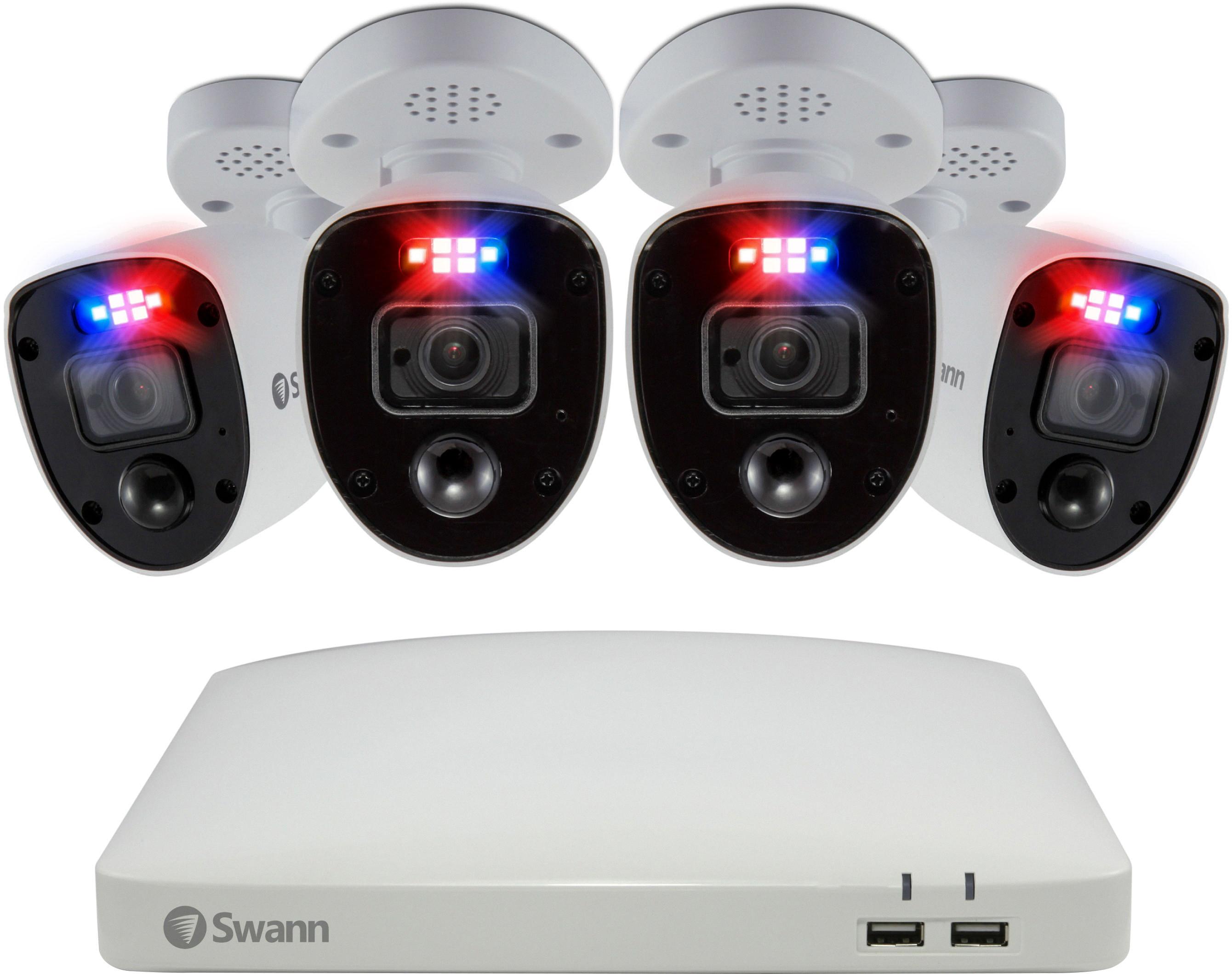A DVR security system is a digital video recorder that is used to store and manage video footage captured by security cameras. It is a popular type of security system used in homes, businesses, and other public places for surveillance and monitoring purposes.
The primary function of a DVR security system is to record and store video footage captured by the connected security cameras. The footage is saved onto a hard drive within the DVR, which allows for easy playback and review of the recordings. This feature is incredibly important for security purposes, as it allows for the identification of individuals involved in criminal activities, accidents, or other incidents that may require investigation.
One of the main advantages of a DVR security system is its ability to work independently. Unlike other security systems that require a constant internet connection, a DVR security system can function on its own withot the need for an internet connection. This makes it ideal for locations where internet connectivity may be limited or non-existent.
Another advantage of a DVR security system is its cost-effectiveness. Compared to other security systems that require ongoing subscriptions or fees, a DVR security system typically only requires a one-time purchase cost. This makes it an affordable option for those who want to install a security system on a budget.
Additionally, DVR security systems are user-friendly and easy to operate. The cameras can be easily connected to the DVR, and the system can be set up in just a few steps. Once set up, the system can be monitored and reviewed using a smartphone app or PC client, which allows for remote access and management of the system.
DVR security systems offer a reliable and cost-effective solution for security and surveillance purposes. They are easy to install, operate, and maintain, making them an ideal choice for homeowners and business owners alike. With their ability to store and manage large amounts of video footage, they provide an essential tool for identifying and investigating criminal activities or other incidents.
Comparing DVR and NVR
When it comes to choosing between a DVR and an NVR camera system, it ultimately depends on your specific needs and preferences. However, there are some key differences between the two systems that you should consider before making a decision.
DVR systems are typically more affordable than NVR systems, making them a popular choice for home security. They are also relatively easy to install and operate, wich is another reason why they are popular among homeowners. However, DVR systems have limited storage capacity since they rely on physical hard drives for storage. Once the hard drive is full, you will need to delete old footage to make room for new footage. This means that if you want to keep your surveillance footage for an extended period, you may need to invest in additional hard drives or upgrade to a more expensive system.
On the other hand, NVR camera systems offer several advantages over DVR systems. They can upload footage to cloud-based servers, allowing for higher storage capacity and eliminating the need for on-premise storage. This makes it easier to store and access footage for an extended period. Additionally, NVR systems can support more cameras than DVR systems, making them a better choice for larger properties or businesses.
NVR camera systems tend to be more expensive than DVR systems, but they offer greater storage capacity and can support more cameras. If you need a system that can store footage for an extended period and support multiple cameras, an NVR system may be the better choice. However, if you have a smaller property or don’t need to store footage for an extended period, a DVR system may be more suitable.

Do I Need a DVR for Security Cameras?
You do need a DVR or NVR for security cameras if you want to store and access the footage captured by the cameras. A DVR (Digital Video Recorder) or NVR (Network Video Recorder) is the central hub of a surveillance system that records and stores the video feeds from the cameras.
Without a DVR or NVR, the security cameras can still function as standalone surveillance devices, but they will not be able to record or store the footage. Instead, the footage will be lost once the camera’s memory is full or overwritten.
Here are some reasons why you need a DVR or NVR for security cameras:
– Storage: A DVR or NVR provides ample storage space to store the footage captured by the cameras. This allows you to review footage at a later time, and also provides evidence in case of a security breach or incident.
– Playback: With a DVR or NVR, you can easily access and review footage from multiple cameras. This can be helpful in identifying suspects or monitoring activity.
– Remote Access: Many modern DVRs and NVRs allow remote access, whih means you can view the footage from anywhere with an internet connection. This is especially helpful for business owners who want to keep an eye on their property while away.
– Motion Detection: Many DVRs and NVRs come with motion detection capabilities, which means they only record when there is movement in the frame. This can save storage space and make it easier to identify important events.
While security cameras can function without a DVR or NVR, having one is essential for storing and accessing the footage captured by the cameras. It provides storage, playback, remote access, and motion detection capabilities, which are all important features for a comprehensive surveillance system.
The Benefits of Using a DVR
There are several benefits of using a DVR or Digital Video Recorder for security camera systems. Firstly, it is a cost-effective option compared to other systems avaiable in the market. As it is a one-time investment, it saves money in the long run.
Secondly, DVR systems do not face signal loss issues as they work on their own. This means that the video footage is recorded and stored on the DVR hard drive, ensuring that any footage captured is always available for viewing.
Thirdly, DVR systems are easy to use. Setting up cameras with the DVR system is straightforward, and the cameras do not need to be programmed or set up when connected to the DVR.
Additionally, DVR systems provide remote access to the video footage, enabling users to view live feeds or recorded footage from anywhere, anytime. This feature is particularly useful for business owners who can monitor activity on their premises even when they are not physically present.
Lastly, DVR systems offer high-quality video recording, ensuring that the footage captured is clear and can be used as evidence if required. This is a crucial feature for security camera systems, as the footage can be used to identify perpetrators in case of any criminal activity.
A DVR system offers cost savings, reliability, ease of use, remote access, and high-quality video recording, making it a popular choice for security camera systems.
Do I Need Internet for a DVR?
A DVR system does not require an internet connection to function locally. It is designed to work as a standalone security system with recording and storage capabilities without the need for an internet connection. However, if you want to remotely access your DVR system using a smartphone app or PC client, an internet connection is required. Therefore, it is important to note that while an internet connection is not necessary for local usage, it is required for remote access.
Conclusion
A DVR security system is a reliable and cost-effective solution for those who want to ensure the safety of their property. It offers several advantages, such as on-premise storage, no signal loss, and ease of use. It is also an excellent option for those who do not have a stable internet connection or who do not want to rely on cloud-based storage. However, it is important to choose a high-quality DVR system that can meet your specific security needs. By doing so, you can have peace of mind knowing that your property is protected around the clock.








